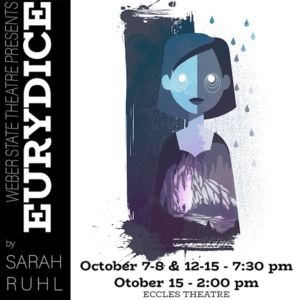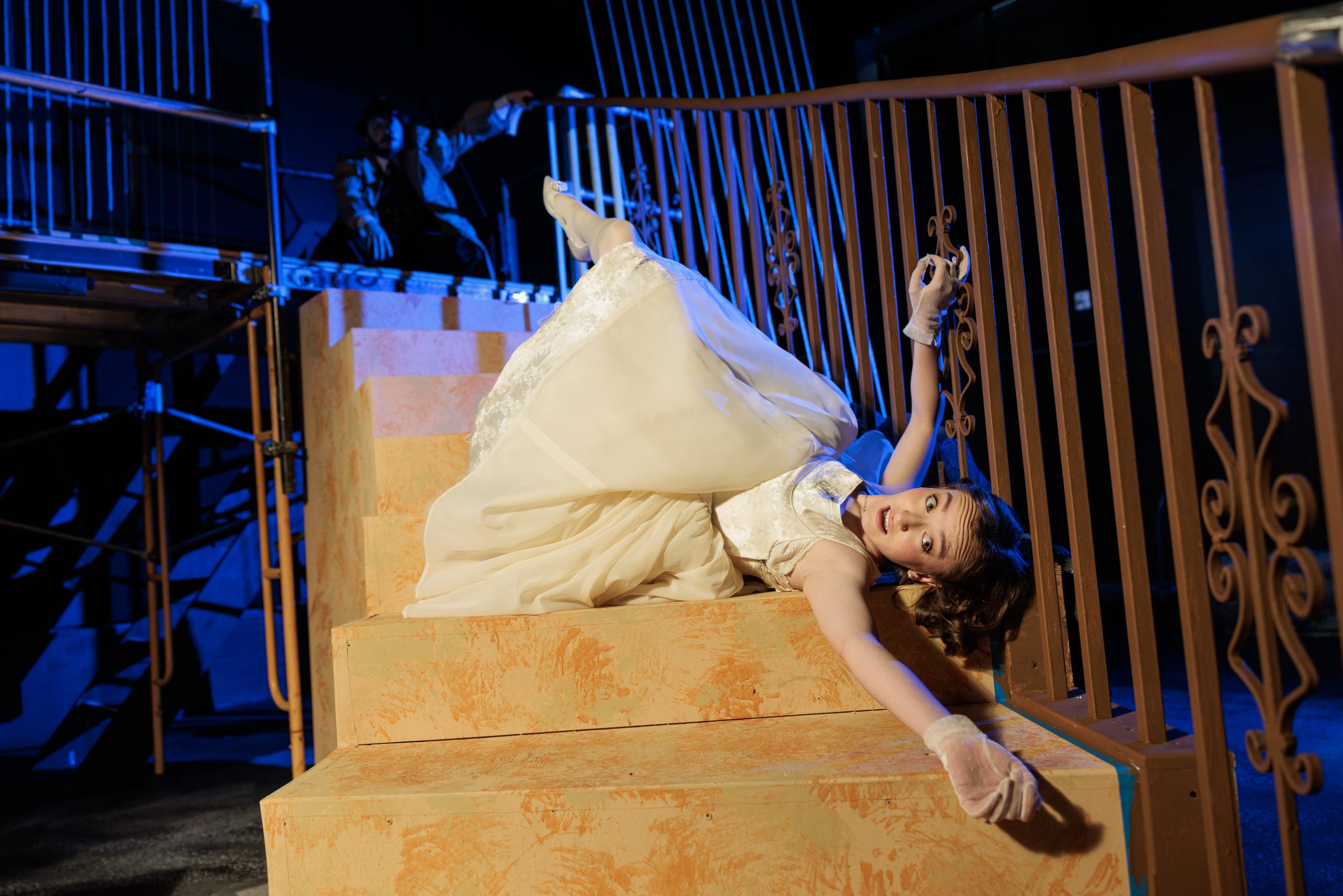OGDEN — I have read the Greek tragedy of Eurydice and Orpheus before in some class long ago and dusted the cobwebs of my mind off of the story before heading to Weber State Val A Browning Center to see Eurydice by Sarah Ruhl. I thought I knew what the story was generally about, but I was so wrong. This version of the story isn’t really about star crossed-lovers. At its heart, this Eurydice is about the love between a father and a daughter and it pulls all the heartstrings.

Scenic designer Cully Long sets the stage of the Eccles Theatre with several spaces. Painted water fills the center of the stage, a circular platform stage right, and a second floor gives spaces for the over world and under world to play out. With lights up we see the lovers cuddling on the platform. Sound designer Grace Heinz puts a whooshing sound of waves followed by retro surfer music to set the scene in the 50s at the ocean. In their vintage swimwear, we see a young couple in love. Orpheus (Kaplan Keener) is a man of few words because his head is so full of music. The beautiful Eurydice (Lily Hilden) is hopeless at music and rhythm, preferring the thoughts and ideas she gets from books. Despite their differences, they are obviously young and deeply in love. Hilden and Keener have excellent chemistry throughout and portray the innocence and excitement of young love as Orpheus proposes.
In the next scene, the audience is introduced to Eurydice’s Father (Diego Batista). He is writing a letter with all the wisdom and advice he wants to give the couple on their wedding day. Towards the end of his speech, I realized he was writing this letter from the underworld, which is why he wouldn’t be there to walk his daughter down the aisle. He leaves his heartfelt letter of advice next to the well in the hope that it will reach his daughter. Batista’s portrayal is warm and fatherly and sets up the true love story of the play before he even shares the stage with Eurydice.
Unfortunately, Father’s letter is intercepted by A Nasty Interesting Man/Child (Spencer Sanders) who tricks Eurydice to following him to his high rise with a promise of getting the letter from her father. Sanders’ performance was the most wonderful thing I have seen in ages. He goes all in the whole time with his performance and has superb comedic timing. His costumes, designed by Citlali Urquiza, are so over the top and captivating as they show when the character is overcompensating, being childish, or exerting demonic power. Sanders’ expressions and mannerisms are eccentric and quirky as he toys with Eurydice repeatedly. Seeing the Lord of the Dead enter with heavy metal music blaring while he rides onto the stage on a tricycle wearing the little boy’s sailor outfit was a hilarious and effective juxtaposition.
Eurydice follows the Interesting Man/Child to his high rise on her wedding night to get the letter from her father and falls to her death as she hurries away. Lighting design by Jessica Greenberg helps his high rise seem much higher with blue gels as they ascend, and a strobe light effect makes Eurydice slow-motion fall down the stairs a powerful moment as she plummets to her death.
When Eurydice arrives in the underworld, she can’t talk at first. She tries to explain how exhausting the journey to the underworld has been, recounting going over a river, riding a train that wasn’t a train, then going down the elevator that was raining, all to get to the underworld and find out that there are no rooms. To help the audience learn the rules of the underworld the Greek Chorus enters. Big Stone (Madison Grissom), Little Stone (Emma Kate Leishman), and Loud Stone (Ja’reese Barber) are able to tell Eurydice and the audience the rules of being dead. There are no rooms, no names, and no music in the underworld. Eurydice has forgotten her life, and her love that she left behind. Each stone was unique in its own way, but the actresses worked together well for the choral chanting that all Greek plays require. Some productions make the Greek chorus feel even more foreign, but Director Tracy Callahan uses the chorus’ role artfully.
Eurydice feels like she arrives in the underworld with nothing but an empty suitcase, but that’s not true. What she has is her father there to greet her. He doesn’t care that she can’t remember him. He takes care of her anyways. She wants a room, so he makes a room. He explains to her how a mnemonic device of her name, Eurydice, helped him to remember his life, and he commits to teach the words to her. This leads to her asking him all kinds of questions about what his life was like when he was young.
I must commend playwright Ruhl here by making a modern adaptation that is relatable. The story of Eurydice is certainly there, but the translation is not word for word by any means. Rather, it conveys the feeling of the story. Eurydice asks her father what it was like growing up for him, and he tells her about the lights over the Mississippi river in Illinois when he was small. The imagery is relatable to the modern audience but conveys the same feelings people have wrestled with for thousands of years. Questions of love, loss, and death are raised and left hanging for the audience to ponder.
Director Callahan has made a thought-provoking show that may feel a little strange to some. The technical elements of the show are all well done. Each element is cohesive and artistic, by which I mean it starts in a familiar place and then gives an unexpected twist. Urquiza’s costumes ground the play in the 1950s, but the chorus of Stones had fantastical costumes with elements from many time periods but held together by three colors. Heinz’s sound design has very 50s music as a base then veers into heavy metal, techno, and unique original compositions by Carey Campbell. It was all both a little strange and fascinating. If the production were a movie, then it would be PG because of some kissing and innuendo, but I wouldn’t recommend to young theatre patrons. This show is for a more mature audience that can follow deeper meanings and symbolism that is laced throughout the show. Water is a particularly poignant symbol of life and death and plays into the design of the set, lighting, and sound design. Theatre patrons will be left with plenty of deep questions to ponder about the connections we have to parents as well as lovers. The ending of this tragedy is particularly poignant and worth seeing. The Father’s final scene was touching as he let his little girl go and pursue her life, despite his own heartbreak. I know my heart was a little broken at blackout, and I was left with a lot to ponder.
[box]The Weber State University Department of Performing Arts production of Eurydice plays October 7-8 & 12-15, 2022, at 7:30 PM at the Eccles Theatre in the Val A Browning Center for the Performing Arts (1901 University Cir, Ogden). Tickets are $11-$16 and can be purchased through the Weber State University ticket office. For more information, please visit their website.[/box]
